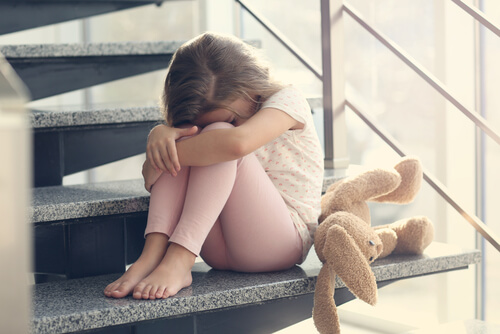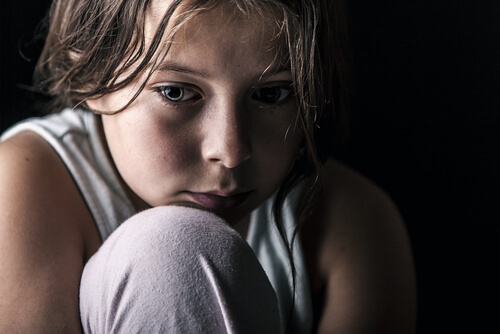The Effects of Indirect Violence in the Family


Written and verified by the psychologist Sergio De Dios González
Beyond conflict between spouses, there exist many other fears and doubts which can affect the family. These can have repercussions both directly and indirectly on the children. However, do we really know the consequences that this situation may have on them? What are the indirect effects of violence in the family?
Child abuse
Psychological abuse in the family or family violence is often camouflaged behind education. In these cases, the aim is to break the will of the child, thus turning them into an obedient and docile being. Children in these situations are unable to react, finding themselves under a dictatorship of silence.
Psychological abuse directed at children appears through verbal violence, contemptuous behavior, emotional rejection, contradictory education, and disproportionate demands in relation to the child’s age. This type of family violence, which is never insignificant, can be exercised either indirectly or directly.

The effects of indirect violence in the family
Psychological abuse and indirect violence affects children on the rebound. That’s because the violence itself is exerted by one of the parents toward the other. This overspills onto the children. The aggressor parent will use means of verbal communication (contempt, scorn, insults, lies, etc.), as well as non-verbal (sneering, pointing, etc.). They might also destroy physical objects and exhibit violent behaviors such as beatings.
Therefore, the children also become victims for the simple fact of being there. Furthermore, they refuse to distance themselves from the attacked parent. They’re witnesses of the conflict, and on the receiving end of all the damage the situation entails. For this reason, they begin to isolate themselves. In fact, they lose their capacity for individuation, due to the situation in which they find themselves immersed. In addition, they have to suffer the aggressiveness of the attacked parent who’s been unable to act out their aggression with the other parent, as well as the conflict between the two of them.

Long term effects of indirect violence
This situation of isolation can have serious consequences for children. Indeed, if they don’t find a way of dealing with it on their own, they’ll end up with a heavy load of suffering that they’ll subsequently reproduce with other people, and in other situations. That’s because, over time, the aggressor parent passes the hatred toward their partner on to their children as well. No matter what the reason, this is completely unacceptable behavior.
The ambiguous situations that children experience can, sooner or later, lead to their self-destruction. This is due to their feelings of uncertainty and moments of confusion, to which they’re subjected in one way or another. The malicious and hateful behavior and bad intentions of the aggressive parent introduce them into a never-ending spiral from which they can’t escape.
Making the child pay for their own suffering
Occasionally, children internalize a negative image of themselves because they feel it’s what they deserve. That’s due to the fact that the aggressor parent so frequently humiliated them. Interestingly, it’s often the case that the parent suffered similar in their own childhood. They might even still be suffering.
In these instances, if their child is happy or successful in some way, it becomes unbearable for them. Because they feel a need to make their child pay for their own suffering, past or present. Children can be easily manipulated with emotional blackmail. That’s because they have no limits to their tolerance and always excuse the people they love. Consequently, they’re always ready to forgive their parents, take the blame themselves, and try to understand them.

A difficult problem
For children, family violence is an extremely difficult situation. That’s because they’re under the orders of only one parent. The other parent who’s being attacked can never really help them. Furthermore, the situation can worsen when the non-attacking parent walks away and leaves the child alone to face the contempt of the other.
You might think that this is a rare situation. However, the truth is that it’s rather frequent. For this reason, it doesn’t hurt to take a look at your habits and behaviors from time to time, with the aim of modifying them if necessary. Because violence doesn’t only mean raising a hand to a child or hitting them, it also involves humiliating, criticizing, and despising them.
Beyond conflict between spouses, there exist many other fears and doubts which can affect the family. These can have repercussions both directly and indirectly on the children. However, do we really know the consequences that this situation may have on them? What are the indirect effects of violence in the family?
Child abuse
Psychological abuse in the family or family violence is often camouflaged behind education. In these cases, the aim is to break the will of the child, thus turning them into an obedient and docile being. Children in these situations are unable to react, finding themselves under a dictatorship of silence.
Psychological abuse directed at children appears through verbal violence, contemptuous behavior, emotional rejection, contradictory education, and disproportionate demands in relation to the child’s age. This type of family violence, which is never insignificant, can be exercised either indirectly or directly.

The effects of indirect violence in the family
Psychological abuse and indirect violence affects children on the rebound. That’s because the violence itself is exerted by one of the parents toward the other. This overspills onto the children. The aggressor parent will use means of verbal communication (contempt, scorn, insults, lies, etc.), as well as non-verbal (sneering, pointing, etc.). They might also destroy physical objects and exhibit violent behaviors such as beatings.
Therefore, the children also become victims for the simple fact of being there. Furthermore, they refuse to distance themselves from the attacked parent. They’re witnesses of the conflict, and on the receiving end of all the damage the situation entails. For this reason, they begin to isolate themselves. In fact, they lose their capacity for individuation, due to the situation in which they find themselves immersed. In addition, they have to suffer the aggressiveness of the attacked parent who’s been unable to act out their aggression with the other parent, as well as the conflict between the two of them.

Long term effects of indirect violence
This situation of isolation can have serious consequences for children. Indeed, if they don’t find a way of dealing with it on their own, they’ll end up with a heavy load of suffering that they’ll subsequently reproduce with other people, and in other situations. That’s because, over time, the aggressor parent passes the hatred toward their partner on to their children as well. No matter what the reason, this is completely unacceptable behavior.
The ambiguous situations that children experience can, sooner or later, lead to their self-destruction. This is due to their feelings of uncertainty and moments of confusion, to which they’re subjected in one way or another. The malicious and hateful behavior and bad intentions of the aggressive parent introduce them into a never-ending spiral from which they can’t escape.
Making the child pay for their own suffering
Occasionally, children internalize a negative image of themselves because they feel it’s what they deserve. That’s due to the fact that the aggressor parent so frequently humiliated them. Interestingly, it’s often the case that the parent suffered similar in their own childhood. They might even still be suffering.
In these instances, if their child is happy or successful in some way, it becomes unbearable for them. Because they feel a need to make their child pay for their own suffering, past or present. Children can be easily manipulated with emotional blackmail. That’s because they have no limits to their tolerance and always excuse the people they love. Consequently, they’re always ready to forgive their parents, take the blame themselves, and try to understand them.

A difficult problem
For children, family violence is an extremely difficult situation. That’s because they’re under the orders of only one parent. The other parent who’s being attacked can never really help them. Furthermore, the situation can worsen when the non-attacking parent walks away and leaves the child alone to face the contempt of the other.
You might think that this is a rare situation. However, the truth is that it’s rather frequent. For this reason, it doesn’t hurt to take a look at your habits and behaviors from time to time, with the aim of modifying them if necessary. Because violence doesn’t only mean raising a hand to a child or hitting them, it also involves humiliating, criticizing, and despising them.
This text is provided for informational purposes only and does not replace consultation with a professional. If in doubt, consult your specialist.







